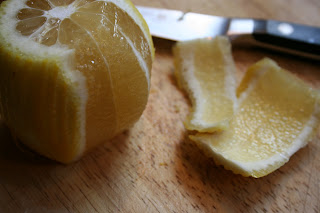
For some reason I felt anxious about the idea of canning. To me, canning is usually reserved for summer time, with large quantities of everything ripe and juicy. The marmalade is a first winter
 attempt at canning and a small batch at that...6 cups maximum. I do not remember canning such a small amount of anything...ever. In the past, I forced myself to jump into canning by buying fruit and vegetables in bulk, straight from the farms. The idea was learn or have the produce spoil and lose all the excitement over saving so much money. I bought hundreds of pounds of peaches, apples, pears, onions, and tomatoes for just over 100 dollars the summer before last. The fun and feeling of accomplishment created an atmosphere of pride and excitement. I knew for sure, this time I would not forget and continue canning throughout the year. College, work, family, and life interfered with that thought process. Now, here I am, doubting myself again and thinking how much money I would actually be wasting to just let the lemons spoil or squeeze the juice out and make something else I could comfortably bake? Nope, I am doing this, wind storm or not.
attempt at canning and a small batch at that...6 cups maximum. I do not remember canning such a small amount of anything...ever. In the past, I forced myself to jump into canning by buying fruit and vegetables in bulk, straight from the farms. The idea was learn or have the produce spoil and lose all the excitement over saving so much money. I bought hundreds of pounds of peaches, apples, pears, onions, and tomatoes for just over 100 dollars the summer before last. The fun and feeling of accomplishment created an atmosphere of pride and excitement. I knew for sure, this time I would not forget and continue canning throughout the year. College, work, family, and life interfered with that thought process. Now, here I am, doubting myself again and thinking how much money I would actually be wasting to just let the lemons spoil or squeeze the juice out and make something else I could comfortably bake? Nope, I am doing this, wind storm or not.Lemon and Ginger Marmalade
(adapted from Fine Cooking Magazine: March 2009) This golden-hued marmalade is right at home on toast, but it’s also divine stirred into plain yogurt or dolloped on coconut ice cream.
Makes about 5-1/2 to 6 cups
Ingredients:
1-1/2 to 2 lb. lemons (6 to 8 medium)
1/2 cup finely chopped fresh ginger
One 1-3/4 -oz. package powdered pectin
6-1/2 cups granulated sugar
(Ginger peeled with a spoon edge is better for preserving more ginger and only removing the actual peel.)
Directions:
Peel the zest from the lemons with a vegetable peeler, avoiding as much of the white pith as 
Trim the ends from the zested lemons to expose the flesh. With one cut side down on the cutting board, trim the pith off the lemon all the way around and discard the pith. Quarter the lemons lengthwise and remove any visible membranes and seeds. Slice the wedges crosswise 1/4 inch thick—you’ll need about 1-1/2 cups.
Add the sliced lemons, ginger, and 2 cups water to the lemon zest. Bring to a boil over medium-high heat, adjust the heat to maintain a simmer, and cook until the zest is soft and the membranes start to break down, 6 to 8 minutes.
Whisk the pectin into the mixture. Increase the heat to high, add the sugar, and bring to a boil, whisking constantly to smooth lumps. Boil vigorously for 1 minute, whisking constantly (move the pan off the burner momentarily if it threatens to boil over). Remove the pan from the heat and let sit undisturbed for 5 minutes.
Skim any foam and seeds off the surface of the marmalade. Stir gently to redistribute the solids. Transfer the marmalade to heatproof storage containers, let cool to room temperature, and then refrigerate for up to 1 month.
For longer storage at room temperature, can the marmalade. See the canning directions below.
To can the marmalade:
Transfer the hot marmalade to clean, hot canning jars, leaving 1/2 inch of headspace in each jar, and wipe the edges clean with a paper towel. Screw the lids on tightly.
Put the jars in a large pot of water fitted with a rack insert. The water should completely cover the jars by at least 2 inches. Return the jars to the pot of water and make sure the water covers them by at least 2 inches. Boil, covered, for 10 minutes. Use tongs to remove the jars; let them cool undisturbed on the counter. You should hear a popping sound as the jars cool, indicating that the vacuum seals have worked.






